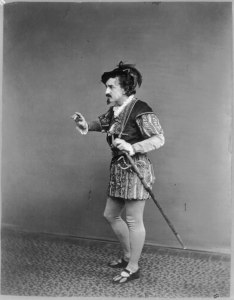We support our Publishers and Content Creators. You can view this story on their website by CLICKING HERE.
The same dynamic on display in Shakespeare’s “Othello” plays out within the human heart. There is an inner Iago who lies to us, and we want to believe that liar and believe that he is honest and loves us. Do we swallow his lies, or challenge his deception with the astringent face-splash of truth?
 The direction of my own writing at this time is towards fiction and drama, and so as to better enhance my own efforts I am re-reading the master—the Bard of Stratford. Delving again into the Tragedy of Othello, I am both mystified and intrigued by Iago. What are the motivations for his villainy? Why does he care? Why should we care?
The direction of my own writing at this time is towards fiction and drama, and so as to better enhance my own efforts I am re-reading the master—the Bard of Stratford. Delving again into the Tragedy of Othello, I am both mystified and intrigued by Iago. What are the motivations for his villainy? Why does he care? Why should we care?
Viewing the recent film version featuring Laurence Fishburne and Kenneth Branagh did not assist me in solving the puzzle. As he did in Hamlet, Branagh produced a film that is sumptuous to look at and pleasing to the ear, but his portrayal of Iago does little to reveal the inner dynamics of betrayal and deceit.
It was in re-reading the text that Shakespeare’s intentions become clearer. Othello is a study of the dynamics of deceit. To be sure, Iago is a villain—a lying, duplicitous, Machiavellian monster—but Othello is the main character, and it is Othello’s interactions with Iago that help us see the complicated dynamic of deceit; this realization is what makes the play a universal classic because the dynamics of deceit are forever percolating below the surface of all of our lives: in politics, in personal relationships, in business, and most of all in our own self-perception.
What comes clear as we re-read Othello is that Iago’s villainy is a dangerous dance. Othello is not only compliant. He is complicit. Iago instinctively knows Othello’s weak point. He knows what Othello wants to hear and what Othello (despite his protestations otherwise) wants to believe. Iago then drippingly feeds Othello’s insecurity, distrust, and suspicions. Morsel by morsel he feeds Othello the bait. But is Othello the victim?
Not completely. He wants to believe Iago is honest and repeatedly reassures himself and Iago that Iago “loves him.” Othello suspends his suspicions. He trusts Iago and loves Iago because Iago tells him what he wants to hear and leads him to believe what he had already suspected (and wanted to believe) was the case. Such is the nature of deceit: Yes, the devilish deceiver is stalking about like a hungry lion seeking whom he may devour, but he is also a beautiful beast: one we love to admire, one we long to have on our side, one we want to believe because his lies prop up our prejudices.
As the United States is embroiled in a foul-smelling general election, one cannot help but trace the same dynamic of deceit playing out on the stage of national politics. Devotees of politicians long to believe that their candidate is “honest and true”. They long to commit themselves to their political Iagos—hoping beyond all reason that their man or woman will serve them and be faithful to their interests. Meanwhile the cunning candidate feeds their followers one lie after another, mouthing pious platitudes and flatulent flattery to attract adoring acolytes. Then, when their backs are turned the Iagos switch tactics, tack the other way, and betray their Othellos. Nevertheless, the loyal lemmings continue their devotion, convincing themselves that beneath the betrayal their Iago really does love them and is honest.
And if we see this dynamic of deceit playing out on the political stage, it should make us aware that the same devious dance of compliance and complicity too often infects our personal relationships—at work, at home, at school, at play. The deceiver knows what we want to hear and feeds us juicy morsels until we are finally snared by his hook.
Shakespeare shows Iago to be conscious of his villainy, but the genius of the play is that as we see Iago acting out (if we have a deeper, inner vision), we understand that this villainy is more often enacted in a subtle, unconscious way. The Iagos work their deceit with an unerringly, efficient accuracy in the everyday relationships, and the Othellos swallow the lies with unsuspecting innocence, deceived first by their own hubris—their unseen prejudices, weaknesses and ignorance.
Whether it is in the torrid tunnels of social media or the glossy channels of the mainstream media, the Iagos toss red meat to their hungry, prejudiced Othellos. They fuel the fear, jack up the jealousy, stir up the hatred, and pander to the paranoia, and the Othellos are uncritical. They eat it up. It is an addiction. Iagos are the pushers and the Othellos are the junkies.
Furthermore, this same dynamic plays out within the human heart. There is an inner Iago who lies to us, and we want to believe that liar and believe that he is honest and loves us. Do we swallow his lies, or challenge his deception with the astringent face-splash of truth?
The dynamic of deception is, of course, the same dynamic that played out in Eden. Yes, our first parents were seduced by the Father of Lies, but they wanted what he offered and longed for his lies. Othello is rightly one of Shakespeare’s great tragedies for it shows us the intricate maze of deception and the depth of human darkness—a darkness that is soaked in blood.
Fr Dwight Longenecker’s latest stage play is Free Will—a drama of a family locked in secrets and lies. Read his blog, browse his books and be in touch at dwightlongenecker.com
The Imaginative Conservative applies the principle of appreciation to the discussion of culture and politics—we approach dialogue with magnanimity rather than with mere civility. Will you help us remain a refreshing oasis in the increasingly contentious arena of modern discourse? Please consider donating now.
The featured image is Edwin Booth as Iago in Othello, “let us be conjunct” (1870), and is in the public domain, courtesy of Wikimedia Commons.
Share This Story, Choose Your Platform!
Go to Top

 Conservative
Conservative  Search
Search Trending
Trending Current News
Current News 





